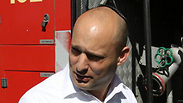There are quite a few Israelis who, ever since this government was sworn in, have been caught in a dilemma: Should they resign from their public roles in protest of government actions that are opposed to their conscience and worldview? Or stay and try to minimize the damage?
The question has now been laid at the feet of senior state officials, as well as members of public committees and national institutions. The answer is not simple: On one hand, they see their responsibility, mission, habits, influence, power; on the other hand, the daily actions of the government – new bills, embarrassing nominations, and inflammatory rhetoric.
“We’ve gone from having a hostile government to a foreign government,” said former Jerusalem mayor Teddy Kollek after the Likud victory in the 1977 elections. If he were alive today, he would of course say: “We’ve gone from a hostile government to a dissolute government.”
Six professors announced on Sunday that they were resigning from their positions at the Israeli Council for Higher Education (CHE). Their resignations were meant as a protest against personal decisions taken by the council’s chair, Education Minister Naftali Bennett (Bayit Yehudi). It was accompanied by a petition bearing the signatures of 1,500 academics. Because the council legally must have at least 19 members, and the resignations left 16, the move essentially paralyzed the CHE.
Battles in academia are usually only of interest to professors. But this battle is different: it affects the cash flow of billions of shekels from the state budget, the financial solvency of universities, the well-being of hundreds of thousands of students, and most of all, the quality of research that can be conducted at these universities.
The root of the crisis can be traced to Bennett's decision to appoint Professor Yaffa Zilbershats from Bar-Ilan University to head the HCE's Budgetary Committee. Zilbershats replaced Manuel Trajtenberg, who went into politics. Her appointment was seen as an insult to the position – Zilbershats is not a tenured professor – and and as a sectarian appointment: the national-religious sector and its political party seeking to gain another position of power.
In the second phase, Bennett pushed out Professor Hagit Meser-Yaron, deputy chairman of the Education Council. The third stage was replacing her with Doctor Esther Yadmani, whose academic ranking is far lower than the expected standards such an senior and influential a position in the academic establishment.
Bennett's opening moves won the approval of the CHE. There was some protest, but there was no rebellion. The appointment of Yadmani was one step too far. "I've had it up to here," one of the professors who didn't resign told me.
Bennet has to hurry up and appoint new members to the council. He might pick them from the list of Bayit Yehudi party activists, or, alternatively, he can ask university presidents to provide him with candidates. The decision is in his hands. The best candidates may refuse – especially after the collective resignations of their colleagues, they won't want to look like collaborators.
Either way, the new candidates will certainly not be more loyal to the quality and independence of higher education than those who resigned. And here lies the dilemma; the resignations were meant to shock the establishment, but may well bury it.
Bennett is not the average religious-nationalist politico. He is not known as someone who hides within the religious-nationalist bubble, or as someone who seeks to conquer positions of power in the party at any price. Nevertheless, his moves are dragging him towards this corner. The question is where he will go from here, whether he will explort the resignations in order to restart his relations with the academic institutions, or alternatively, dig into his position.
Ever since the rumor spread among the religious-nationalist sector that it is the new elite, the vanguard, the cutting edge of Israeli society, there is no limit to their expectations. Instead of demanding their fair share, some expect to receive everything and right away. They hold the keys to the Prime Minister's Office, the Ministry of Justice, the Ministry of Education, and the courts;some even sought to make make the entire IDF religious – to turn the Israel Defense Foces into the army of God. This crazy idea returned and hit them like a boomerang; now there are those amongst them who are requesting to appropriate for themselves Israel's research and science.



















